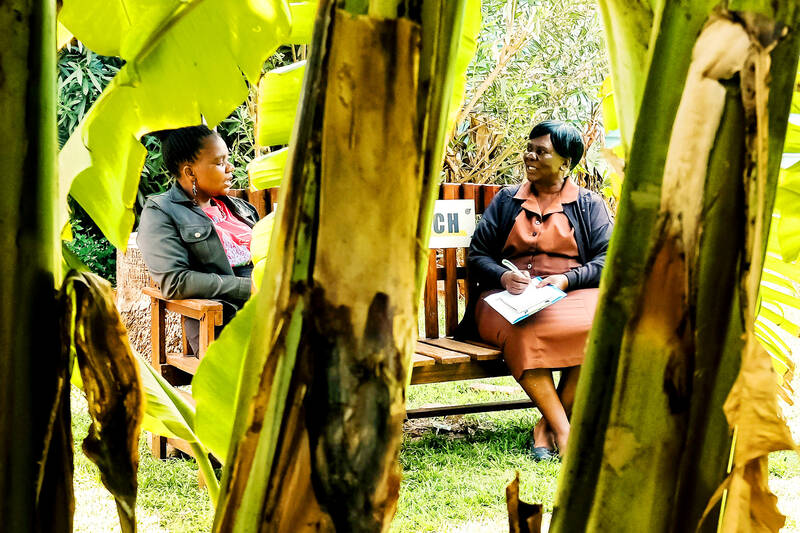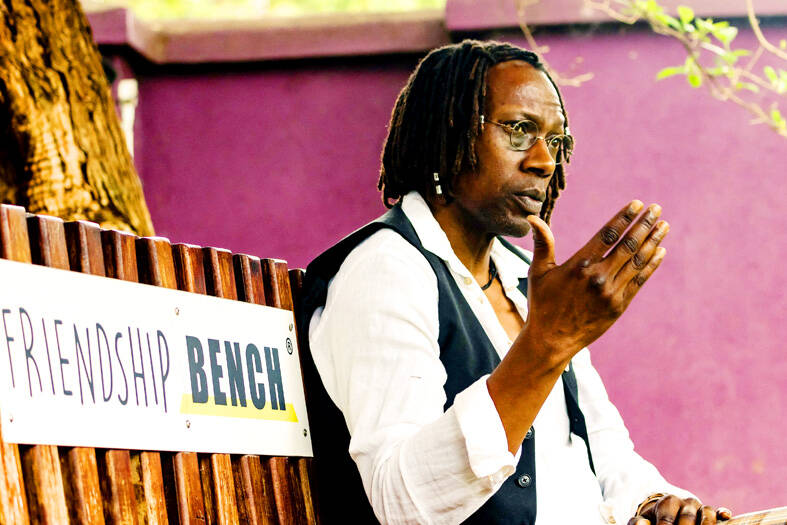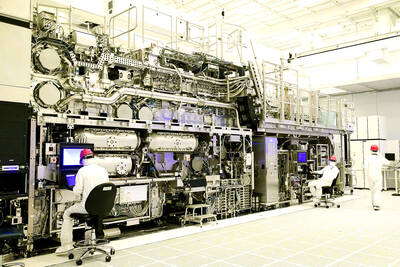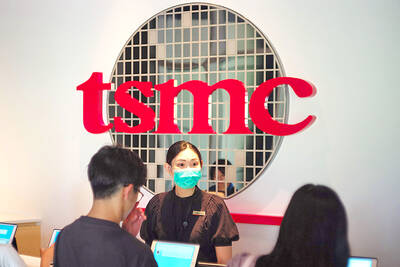Sitting next to a patient with depression on a garden bench in Zimbabwe’s capital, Harare, 70-year-old Shery Ziwakayi speaks gently, offering accessible therapy with a warm and reassuring smile.
“You have made the right decision to come to see mbuya,” she tells her client, using the Shona word for “grandmother” and offering a handshake.
A Zimbabwean doctor has come up with a novel way of providing desperately needed mental health therapy for his poorer compatriots by using lay health workers, colloquially referred to as “grandmothers.”

Photo: AFP
University of Zimbabwe psychiatry professor Dixon Chibanda’s concept is simple: a wooden park bench, on which people experiencing common mental disorders can sit and receive free therapy.
Chibanda’s “Friendship Bench” has proved popular and offered much-needed, accessible therapy.
Decades of economic hardships and deepening poverty have taken a mental toll on many Zimbabweans, imposing a huge burden on underfunded and understaffed psychiatric health services.

Photo: AFP
The Friendship Bench has helped bridge a shortage of professional healthcare workers in Zimbabwe — which has only 14 psychiatrists, 150 clinical psychologists and less than 500 psychiatric nurses serving a population of 16 million people.
“We need these alternative innovations to narrow the gap and my idea is to use grandmothers to provide therapy,” said Chibanda, wearing dreadlocks and round-framed spectacles.
The benches are spaces “to share stories and through storytelling we can all be healed,” he said.
His therapy model is now being exported to the soccer World Cup in Qatar, where 32 benches — each representing a team competing in the tournament — are to be set up to cast the spotlight on global mental health.
The World Cup project is in partnership with the WHO, whose director-general, Tedros Adhanom Ghebreyesus, has praised the initiative as “a simple yet powerful vehicle for promoting mental health.”
It is “a reminder of how a simple act of sitting down to talk can make a huge difference to mental health,” Tedros said.
Other countries to have adopted the friendship bench model include Jordan, Kenya, Malawi, Tanzania and the US — where 60,000 people in New York have accessed the therapy.
In Zimbabwe, about 70 percent of the population live below the poverty threshold.
Chibanda’s idea germinated after a patient he was treating at a government hospital took her life.
“She didn’t have 15 dollars bus fare to come to the hospital to receive treatment for the depression,” he said. “That was the initial trigger that instantly made me realize that there was need to take mental health from the hospitals into the communities.”
Ziwakayi has offered therapy from the benches for the past six years, seeing an average of three patients a day.
“Through talking to us many have recovered and are leading normal lives again,” said Ziwakayi, who received training in basic counselling skills, mental health literacy and problem solving therapy.
The counselors are given a stipend for their services, and the operation is financed by Chibanda’s non-governmental organization the Friendship Bench.
Her patients come from all walks of life — young, old, suffering from stress or dealing with drug addiction. Some are unemployed or in financial trouble, others have experienced gender-based violence.
On a white sheet clipped to a blue handheld board, she asks those who come to her if they are frightened by trivial things, feel run down or have felt like taking their lives, among a host of other questions.
Choice Jiya, 43, said she owes her life to the service offered on the benches, having considered suicide when her husband lost his job shortly after she gave birth to their twins in 2005.
“Before I went to the bench for therapy, I thought killing myself was a solution,” she said.
She now operates a small business making perfumes and soap.
From just 14 “grandmothers” in Mbare — Zimbabwe’s oldest and poorest township — at the start in 2006, there are now nearly 1,000 benches and more than 1,500 counselors in different localities.
They have assisted 160,000 people in the past two years alone.
The fallout from the COVID-19 pandemic has seen a spike in mental health problems, and the WHO estimates that more than 300 million people across the globe suffer from depression.
Its most recent report “paints a very bleak picture,” showing that six out of 10 countries with the highest suicide rates in the world are in Africa, Chibanda said.
For Prosper Chonzi, a senior health service official at the Harare City Government, the benches are a “masterstroke.”
“Demand for mental health services is high due to the economic situation. This is one of the best interventions. “It has made a huge difference in terms of averting suicides,” he said.

ASML Holding NV’s new advanced chip machines have a daunting price tag, said Taiwan Semiconductor Manufacturing Co (TSMC, 台積電), one of the Dutch company’s biggest clients. “The cost is very high,” TSMC senior vice president Kevin Zhang (張曉強) said at a technology symposium in Amsterdam on Tuesday, referring to ASML’s latest system known as high-NA extreme ultraviolet (EUV). “I like the high-NA EUV’s capability, but I don’t like the sticker price,” Zhang said. ASML’s new chip machine can imprint semiconductors with lines that are just 8 nanometers thick — 1.7 times smaller than the previous generation. The machines cost 350 million euros (US$378 million)

Apple Inc has closed in on an agreement with OpenAI to use the start-up’s technology on the iPhone, part of a broader push to bring artificial intelligence (AI) features to its devices, people familiar with the matter said. The two sides have been finalizing terms for a pact to use ChatGPT features in Apple’s iOS 18, the next iPhone operating system, said the people, who asked not to be identified because the situation is private. Apple also has held talks with Alphabet Inc’s Google about licensing its Gemini chatbot. Those discussions have not led to an agreement, but are ongoing. An OpenAI

‘FULL SUPPORT’: Kumamoto Governor Takashi Kimura said he hopes more companies would settle in the prefecture to create an area similar to Taiwan’s Hsinchu Science Park The newly elected governor of Japan’s Kumamoto Prefecture said he is ready to ensure wide-ranging support to woo Taiwan Semiconductor Manufacturing Co (TSMC, 台積電) to build its third Japanese chip factory there. Concerns of groundwater shortages when TSMC’s two plants begin operations in the prefecture’s Kikuyo have spurred discussions about the possibility of tapping unused dam water, Kumamoto Governor Takashi Kimura said in an interview on Saturday. While Kimura said talks about a third plant have yet to occur, Bloomberg had reported TSMC is already considering its third Japanese fab — also in Kumamoto — which would make more advanced chips. “We are

EXPLOSION: A driver who was transporting waste material from the site was hit by a blunt object after an uncontrolled pressure release and thrown 6m from the truck Taiwan Semiconductor Manufacturing Co (TSMC, 台積電) said yesterday there was no damage to its facilities after an incident at its Arizona factory construction site where a waste disposal truck driver was transported to hospital. Firefighters responded to an explosion on Wednesday afternoon at the TSMC plant in Phoenix, the Arizona Republic reported, citing the local fire department. Cesar Anguiano-Guitron, 41, was transporting waste material from the project site and stopped to inspect the tank when he was made aware of a potential problem, a police report seen by Bloomberg News showed. Following an “uncontrolled pressure release,” he was hit by a blunt